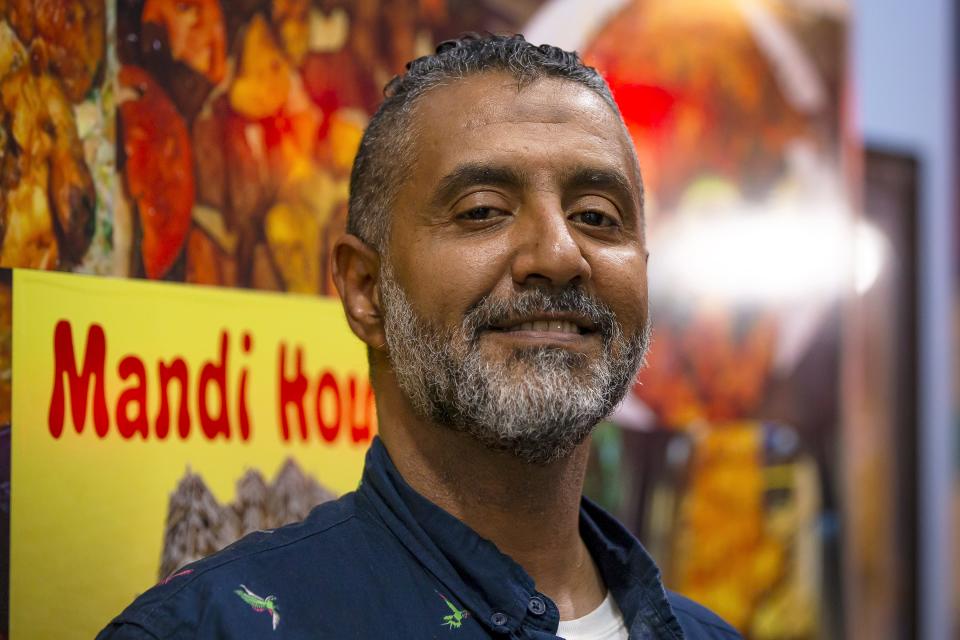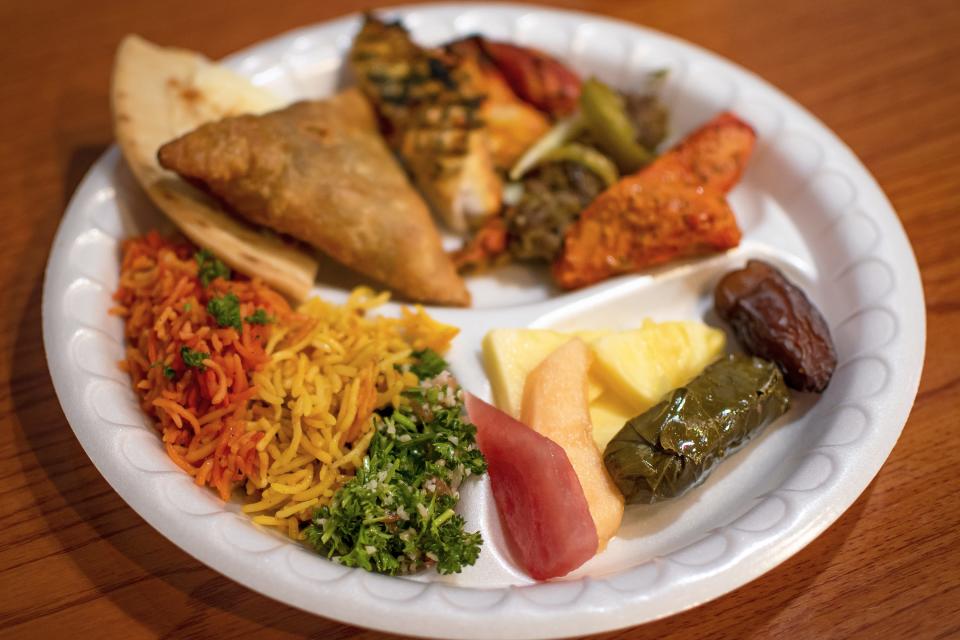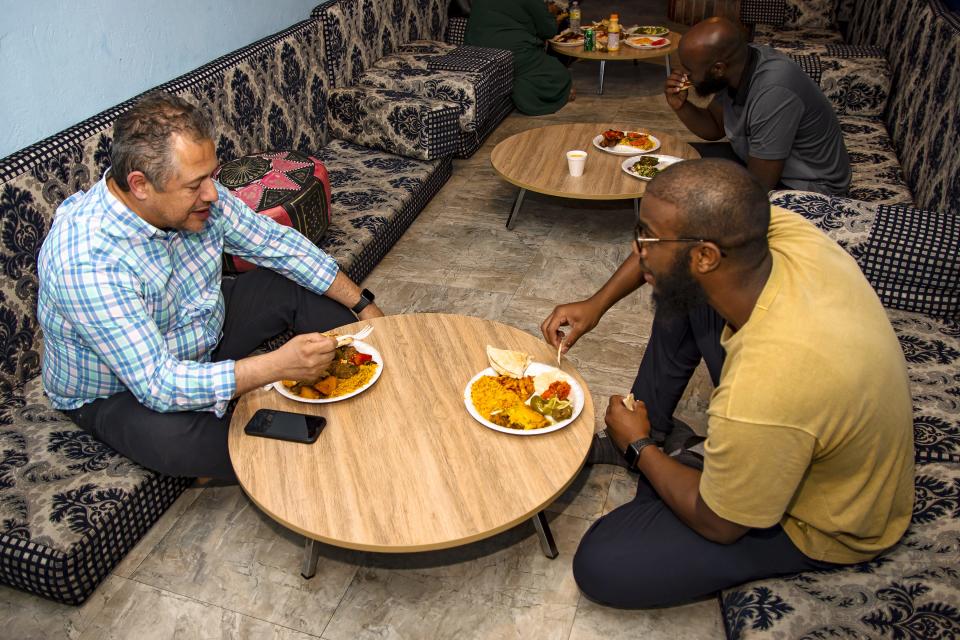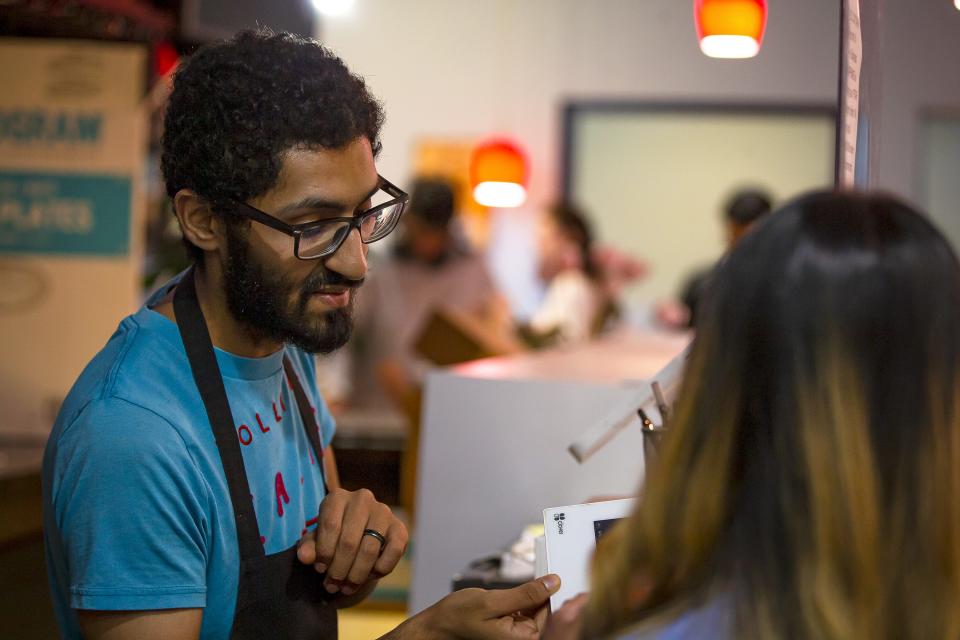He pulls all-nighters to feed metro Phoenix during Ramadan: 'I am here to serve everyone'
On a recent weeknight, the glow of Mandi House spilled onto Apache Boulevard in Tempe. Inside, groups of young men lounged on cushions around half-eaten trays of rice, sipping sweet, clove-spiced tea from Styrofoam cups as they scrolled on their phones. The room occasionally erupted with laughter followed by a flurry of playful teasing in Arabic.
It was a Ramadan scene that wouldn't be out of place in a villa in Kuwait or a casual restaurant in Oman. For many young Khaleeji customers from the United Arab Emirates, Saudi Arabia and other Gulf Cooperation Council countries, owner Rafiq Almansob offers a taste of home, both in terms of the style of cooking and service, which is especially welcome during the Holy Month.
For Muslims around the world, Ramadan turns everyday life upside down, as observers abstain from food and drink from sunrise to sunset. It's a time to slow down, to reconnect with Allah and with the community, to forgive, to do good deeds and to reflect on all there is to be grateful for.
In many Muslim countries, changing the rhythm of life is a given. Businesses shorten working hours for Muslim employees and restaurants and cafes close during the day and remain open all night. Groups of friends go out to eat and drink and spend time together, sometimes until the early morning when they share suhoor, the last meal before starting the fast.
In metro Phoenix, many families host meals at home. Those who don't have family nearby often find a sense of community at local mosques where they can come together for prayers and iftar, the daily breaking of the fast.
But late night Ramadan revelry is harder to find in the Valley, as work responsibilities don't change for the month and most restaurants typically close just hours after the fast can be broken.
Some halal restaurants, like Alzohour in Phoenix, remain mostly closed for the entire month, shifting gears to focus on providing catering to the mosques and for private functions. Others, like Hilal Grill and Mesa's Princess Market, offer a chance to gather for one iftar seating per night.
Where to have iftar: A guide to celebrating Ramadan at halal restaurants in Phoenix
Mandi House is the one halal restaurant in metro Phoenix where life does a full 180, much like it would in the Muslim countries of the Arabian Peninsula, like Yemen, where Almansob is from.

His Tempe restaurant opens at 4 p.m. when he, his brother, his daughter and chef Kaid Mohammed begin preparing food for the iftar buffet. They open the buffet as soon as the sun sets, then continue serving their full menu until 4 a.m. to give Muslims the opportunity to meet for pre-dawn suhoor.
For the buffet, Almansob estimates he usually serves around 40 different items.
"I try to offer basically the entire menu, with some different dishes on different days. At least four or five chicken dishes, all the rice — mandi, biryani, maqluba—a few fish dishes, meat."
Fasting all day and staying up to serve all night takes a toll. "I finish at 4 a.m., I pray, I sleep, I get up and work again. I'm exhausted," he said. "But feeding fasting people during this time, it's a blessing."
Celebrating the end of Ramadan with Eid al-Fitr feasts
As the moon grows ever thinner with the end of Ramadan approaching, thoughts turn to Eid al-Fitr.
The celebration of end of the Holy Month takes place the morning after the new moon is sighted. The sliver moon indicates the beginning of the month of Shawwal and the official end of Ramadan and the month-long fast.
It is one of the biggest holidays of the year for Muslims, many of whom celebrate over the course of three days.
Around the world, special dishes are prepared.
In South Asia, intricate biryanis are often served along with sheer khurma, a creamy dessert of vermicelli noodles cooked in sweetened, cardamom-scented milk and garnished with dried dates and nuts.
In Oman, shuwa, a heavily spiced lamb, goat, camel or beef, is wrapped in banana leaves and buried over embers in a deep pit that's often shared by entire villages. Families mark their meat bundles to tell them apart, unearthing them a day later and serving the shuwa on a massive communal platter of rice.
In some parts of Yemen, the traditional celebration dish is mahshoosha, a slow cooked beef slathered in dark spices like cumin, coriander, cinnamon and cardamom. It's prepared the night the Shawwal moon is spotted and left to cook until after the morning prayers on Eid al-Fitr, when it is served alongside dishes like aseeda—a boiled wheat dough that can be served savory or sweet — and Almansob's favorite, bint al sahn.
"It is delicious, layers of bread and honey, with those little black seeds," he explained, describing the buttery layers of crisp dough soaked in honey and topped with nigella seeds.
Eid al-Fitr is a time to gather and feast. Families put on new clothing and exchange gifts. The celebratory meals typically include labor-intensive, traditional dishes people may not eat any other time of year.
Mandi House offers a taste of home in Tempe
The menu at Mandi House is based primarily around popular rice dishes from the Arabian Peninsula. Yemeni preparations, like slow-roasted mandi, grilled muthbi chicken and stewed haneeth lamb are served over platters of basmati.
There are also a few Levantine rice dishes on offer like maqluba, rice layered with vegetables and meat or chicken that's flipped over onto a plate after cooking, ideally holding its domed shape.
But many customers at Mandi House are there for more than comfort food. They come for a style of dining that reminds them of home.
In addition to booths and tables, the restaurant offers floor seating, a typical way to commune in the eastern parts of Arabia. The pace of service is leisurely, encouraging guests to linger over cups of self-service, complimentary tea. The portions are another draw.

"You know, back there, portions should be huge," he explained. "Here, when we serve our platters to Americans, they are so surprised, like what to do with all this rice? But when we serve the younger ones, the Khaleeji college students who have never been away from home, they take one look and throw up their hands, like, what is this? Why so little rice?"
He laughed, noting that they soon discover that while his portions might not be what they would get at home, they are far closer than anything else they'll find in Arizona.
"I tell them, it is haram to waste, but if they can eat it all, I'll give more," he said. "But they never can finish it anyways."
Almansob was drawn to Arizona by the climate, which is far more similar to Yemen than New York. He ran a grocery store in Brooklyn for a decade before making the move. When he arrived in Phoenix, he didn't plan to open a restaurant, but after a retail business didn't take off the way he had hoped, he met fellow Yemeni, Kaid Mohammed.
"He isn't a trained chef, but he is a great cook," Almansob said. "He can make all the homestyle Yemeni foods."
Unlike in New York, where there were many Yemeni restaurants, there weren't any places for traditional Yemeni or even traditional Khaleeji foods in the Valley.
When they first opened in 2014, they offered mostly classic Yemeni dishes. Over the years, they've adjusted the menu to reflect the tastes of their diverse Middle Eastern and North African customers, adding dishes like hummus and falafel.
Looking back: How food kept the Ramadan 'spirit of giving' alive during the pandemic
Yemeni rice dishes remain the heart of the menu, along with delicacies like meat- or cheese-filled samboosa — triangular pastries said to have been introduced to East Africa and Southern Arabia by Indian spice traders and then adapted to suit local taste with the addition of clove and cinnamon spiced ground meat.

Salteh, a stew that's widely considered the national dish of Yemen, is available upon request. It comes topped with hilba, a pungent condiment made with fenugreek, which can be an acquired taste.
"I mean, I have to have it on the menu, even if only one person orders it every week or month," Almansob said.
During Ramadan, after the sunset meal, the restaurant returns to offering dishes a la carte.
"The rush is right before iftar, of course. Around 7 p.m., it's crazy," Almansob said. "Then again, we pick up from 1 a.m. to 3 a.m."

The most popular late-night dish is not something from the breakfast menu — like foul, a cumin-scented fava bean stew that's eaten with flatbread — but the restaurant's namesake chicken mandi.
In Yemen, the dish is slow roasted in an underground pit over charcoal. A pan of rice is set under the cooking chicken where it is infused with smoke and captures the flavorful juices of the meat.
At the restaurant, Almansob cooks the rice for his mandi separately, but at first, he tried cooking his meat and chicken in a pit.
"I thought, this is my place, I can do what I want," he laughed. "But quickly I learned that, actually, that's illegal. So, now I have a big, vertical fire pit in the kitchen where I can make mandi."

His dedication to providing his community a taste of the dishes they crave from back home meant that there was never any doubt that he would shift his hours during Ramadan and offer a special iftar.
"My business is 80, 90% Arab Muslims," he said. "We are fasting during the day, so why would I stay open when they cannot eat?"
Why dates are a Ramadan tradition: And where to find the best varieties
Eid al-Fitr is a time to share blessings
Though most common on Eid al-Adha, many Muslims also practice a form of Qurbani, or sacrifice, for Eid al-Fitr. In the past, that meant that the animal slaughtered for the celebratory meal would be divided, with a third of the meat given to the poor, a third distributed to friends and family and a third kept for yourself.
At Mandi House, Almansob gives back in another way. "They buy the meat, I cook," he said. "It's not for profit, it's a good deed."
For the final week of Ramadan, his days begin even earlier than usual. He is catering an iftar for 500 people for the Islamic Community Center in Tempe, and he has an order for 100 chicken mandi to prepare for another gathering.
Ramadan recipes: These dishes use dates to sweet-savory effect
Since different communities celebrate Eid on different days, Almansob plans to remain open for the first couple days of Shawwal.
"It will be busy, in the restaurant and catering," he said. "For many people, they will want a whole roasted lamb."
Almansob and the team at Mandi House will take a couple days off and then reopen the restaurant on Friday, which is the day many families go to Jummah prayers and then gather for a meal.
"For me, the celebration is when I can rest. I'd like to take more days, but what can you do?" he said. "I am here to serve everyone, my community."
Mandi House
Details: 1639 E. Apache Blvd., Tempe. 480-659-4751, mandi-house-llc.business.site.
Reach the food, dining and nightlife editor at felicia.campbell@azcentral.com. Follow her @hungryfi on Twitter and Instagram.
Support local journalism. Subscribe to azcentral.com today.
This article originally appeared on Arizona Republic: Mandi House restaurant serves Arabic comfort food in metro Phoenix

